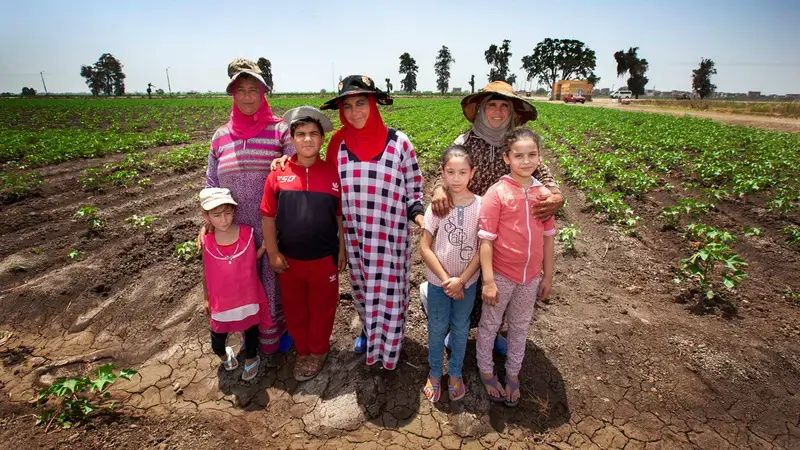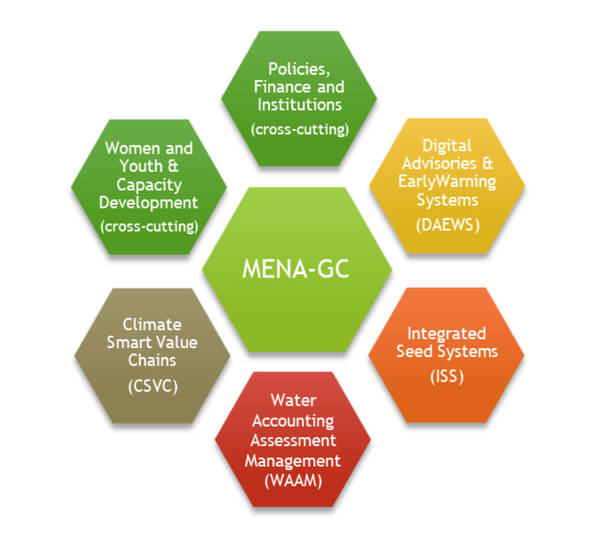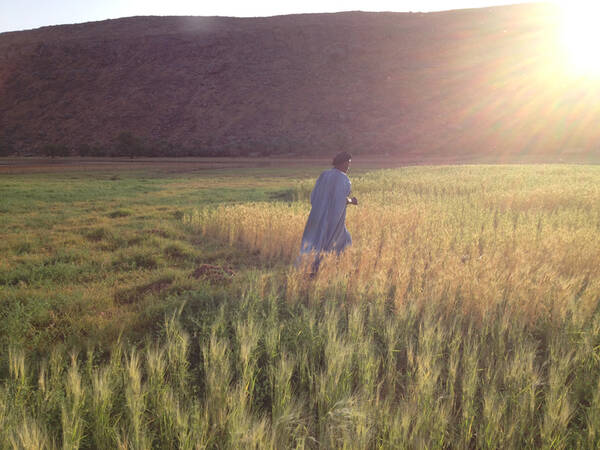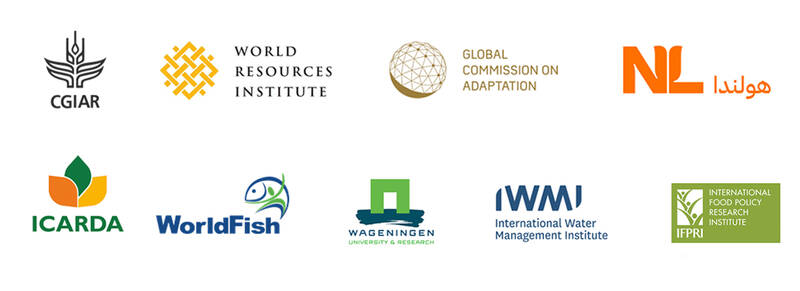THE MENA GRAND CHALLENGE - WORKING TOWARDS CLIMATE-SMART AGRI-FOOD SYSTEMS

The Two Degree Initiative (2DI) launched in 2020 by the alliance of CGIAR, the World Resources Institute (WRI) and the Global Commission on Adaptation (GCA) aims to address grave concerns about the future of rural communities and farmers across the world, by helping to transform agri-food systems into climate-smart frameworks, resilient in the face of a predicted two degrees of global warming by the end of the century.
The 2DI has identified eight geographical hotspots across the world that are vulnerable to climate change and geopolitical challenges, and whose agri-food systems require urgent climate-smart transformation. Having designated the Middle East and North Africa (MENA) as one of these, CGIAR tasked ICARDA with coordinating the MENA Grand Challenge (MENA GC) in collaboration with other CGIAR centers present in the region (IWMI, WorldFish, and IFPRI), the Embassy of the Kingdom of Netherlands in Egypt, Wageningen University and Research (WUR), the World Resources Institute (WRI) and the CGIAR Research Program on Climate Change, Agriculture and Food Security (CCAFS)
Since September 2018, a series of MENA GC brainstorming events have been carried out, giving opportunity for CGIAR centers to discuss with regional partners and stakeholders how to address the climate crisis. Some of these notable events include the ICARDA global meeting in Sept 2018, Cairo Water Week 2019, Near East and North Africa Regional Land and Water Days 2019 (where ICARDA led a technical session on climate change, land degradation and water scarcity, and IWMI led a technical session on water scarcity), and the First Regional Conference 'Improving Water Productivity in Agriculture, 2019’, in Tunis. This resulted in a regional consensus of CGIAR centers along with the Embassy of the Kingdom of the Netherlands in Egypt, towards the creation of a mega hypothesis consisting of six actions implemented holistically with appropriate enabling environments (i.e. public private partnerships and policies), that can make regional agri-food systems climate smart and rapidly enhance the livelihoods of rural communities.
The modus operandi of this mega-hypothesis is an ICARDA coordinated program under the 2DI framework that focuses on the opportunities of public-private partnerships identified as major “Climate Smart (CS) Lifts” defined as a set of drivers, technologies and enabling environment, that can leverage adaptation and mitigation at scale for food security and resilience of socio-ecological systems to climate change in the MENA region. Figure 01 shows four transversal and two cross cutting R4D ”Lifts” are envisaged to be operational holistically, multi-disciplinary, multi-scalar and in a tightly integrated manner to address the climate change vulnerability of the MENA region.
The initiative was launched via stakeholder consultations carried out to discuss the mega-hypothesis as a strategy to build climate smart MENA agri-food systems based on six research-for-development (R4D) actions as shown in the figure above. The CGIAR partners along with WUR and the Embassy of the Kingdom of the Netherlands conducted a series of online MENA GC workshops, built upon previous online consultations, to understand from stakeholders’ perspective what knowledge, partnerships, tools and innovative R4D programs are critically required and through which synergies can be established with other initiatives in the region, in order to provide a comprehensive report and blueprint later in the year. Each of the webinars was led or co-presented by ICARDA and partners, and over 320 participants attended from 18 countries representing key stakeholders (Governmental agencies, research institutes, end-users, private sector, donors, etc). The discussions were dynamic, with diverse talking points that included opportunities and challenges for climate-smart solutions in the region, inclusion of public-private partnerships, priority R4D projects, target donors, and the scalability potential of projects.
It was immediately clear from the unanimous response of all participants that the initiative has been much-awaited in the region to holistically address a MENA climate-smart strategy and to deliver real impact on the ground. It was recognized that the CGIAR 2DI MENA GC is in high demand and an outstanding platform on which regional partners can interact across institutions and across disciplines, break from silos, and challenge the status quo in a smart way. Further outcomes include:
- A pre-meeting stakeholder survey of 108 responders, along with the webinar consultations clarified the clustering of regional perceptions on various aspects. It was clear that all the four transversal Lifts were deemed vital in making MENA climate smart and the general consensus was to implement them holistically with strong synergies.
- The scopes, barriers, enablers and scaling strategies of the four transversal Lifts were deliberated during the stakeholder consultations. Each of these focused discussions on the cross-cutting issues of policies (related to public-private partnership and fostering an enabling environment for transformational change), capacity development, and empowerment of women and youth. Through a united agreement, the mega-hypothesis of these six lifts in the MENA-GC was validated as the ideal approach to transform MENA’s agri-food system into to a climate-smart framework.
- Added clarity was brought to the implementation mechanisms of these Lifts via discussions of a cohort of plausible projects under each that considered the prospects and hurdles of implementation, methodologies, and ability to be scaled in MENA. Importantly, the Lifts were not perceived to be operating in isolation, but with strong interactions and synergies between all parties, innovations and technologies. These points of synergies were discussed during the webinars.
- The MENA GC should build on existing networks and initiatives in the region with its usual partners such as FAO, WFP , IFAD and NARS, and also the private sector, NGOs, and other government institutions (other than NARS) that are actively engaged and making impact on the ground in partnership with countries and organizations.
- Stakeholders expressed their intention to remain engaged with the MENA-GC and support partnerships through project development and implementation through partnerships.
Important challenges were also acknowledged:
-
A sizeable number of stakeholders were engaged, with most representing organizations covering research, academia, ministries, donors, international and national NGOs, and the private sector. However, representation of farmers and civil society needs to be increased. Although people were present who directly work with them, farmer’s input is recognized as crucial to all future MENA GC development and project design.
-
The MENA GC committee welcomes the show of enthusiasm, optimism, and interest for partnership, as well as the united consensus to take this mission forward. The next step is to engage funding partners to support this transformation of MENA’s agri-food systems into a climate smart framework.
The strong participation, energy and passion shown at the workshops reflects a strong regional desire to ensure agri-food systems rapidly become climate-smart in the face of intensifying climate change.
The MENA-GC Committee and the 2DI will now work with the regional stakeholders to develop an action plan and report to achieve the target of a climate smart agri-food sector in MENA. The report can then act as a blueprint for strategic investments by global donors to make a real, positive and urgently needed impact on the livelihoods of vulnerable rural communities in dry areas living under extreme climate conditions.
-------------------------------



